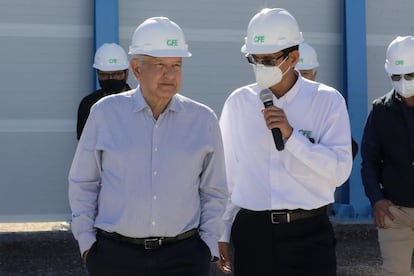Mexico’s president ramps up attacks on all sides ahead of June elections
Andrés Manuel López Obrador is hitting out against the energy sector, the judiciary and the feminist movement, but he still maintains high approval ratings and is expected to sail to victory


Mexican President Andrés Manuel López Obrador is employing an increasingly confrontational tone as federal and local elections loom in June, but fears that he is overstepping the bounds of his power have to contend with a lack of real alternatives from the opposition.
In the last few weeks alone, the center-left populist has taken on the energy sector, the judiciary and the feminist movement, deploying a strategy of attacking almost anything he terms “the neoliberal model.” But with a weak opposition and little evidence his battles are hitting his influence, many say López Obrador will keep doing as he pleases.
Mexicans elected López Obrador as president in 2018, motivated by his anti-corruption message and promise to take on cronyism in the private sector. He swept to victory on a wave of anger unleashed by the violence and poverty that have plagued Latin America’s second-largest economy for decades.
His agenda comes up against his caution not to touch the interests of the real millionaires of this country through a progressive tax reformSantiago Rodríguez, political scientist
These days, from the fight against the coronavirus pandemic to the management of natural resources, the Mexican president deploys slogans about fighting corruption or capitalist greed almost indiscriminately. The latest example is an electricity reform that gives supply priority to a state utility, the Federal Electricity Commission (CFE in its Mexican acronym), over private companies. The measure is particularly controversial because it discourages private investment, especially in renewable sources, although it may prove profitable at the ballot box due to a promise to reduce the size of household electricity bills.
Soon after the law came into effect, a judge temporarily suspended it upon the appeal of a renewable energy company. López Obrador openly demanded an investigation into the judge who halted the reform. Despite criticism from the legal sector that he had overstepped his constitutional remit, he warned that he would do the same “in all cases.”
The president of the Supreme Court, Arturo Zaldívar, along with Mexican judges and lawyers, have called on López Obrador to respect the independence of the judiciary, although the investigation of the judge in the electricity reform case will proceed. López Obrador also attacked the former president of the Court, José Ramón Cossío, and media outlets who have criticised him. Cossío, an EL PAÍS contributor, said Mexico is “witnessing a dispute as to what extent the president will accept judicial decisions.”Meanwhile, Mexico’s leader has also angered feminists by offering his full backing to gubernatorial candidate Felix Salgado Macedonio, who faces two rape allegations and other accusations of sexual harassment as he prepares his candidacy to lead Guerrero state in the June polls.

Paola Zavala Saeb, lawyer and director of Organización Comunitaria por la Paz (Community Organization for Peace), said this came as little surprise. “The president is not interested in the feminist movement, he is not interested in transforming the country with feminism in mind.” However, Zavala Saeb added that no major political party in Mexico had allied with the feminist movement, leaving voters with women’s rights in mind few compelling options.
The criticism of López Obrador continues to mount from other sectors. He also faced an outcry this month from teachers’ unions for announcing an austerity plan for the education ministry, which will entail budget cuts and layoffs. Then there is the country’s Covid-19 strategy, as Mexico approaches 200,000 deaths from the virus according to official data. With the third highest death toll globally, a slow vaccine rollout is of deep concern.
López Obrador spends every day defending his policies as progressive, with carefully placed references to the most vulnerable sectors of society, but he has also been criticized for not doing enough. “For some of his traditional leftist supporters, poverty and inequality are central to his government agenda. However, there has been no concrete and forceful action towards redistribution of wealth,” said Santiago Rodríguez, a political scientist. “Welfare spending as a percentage of GDP has not shifted significantly with this government in respect to the past. The names of the programs have changed and in some cases the recipients, but not the total amount. The main explanation for this is that tax collection continues to be very low.”
In Rodríguez’s opinion, “[López Obrador’s] agenda comes up against his caution not to touch the interests of the real millionaires of this country through a progressive tax reform.” Mexico was one of the few countries in Latin America and the world that did not increase emergency spending to bolster citizens’ falling incomes during the pandemic, Rodríguez noted.
Despite everything, the National Regeneration Movement (MORENA in its Spanish acronym), the party founded by López Obrador and which supports his presidency, is well ahead in the legislative polls, and is expected to form an absolute majority with support from allies in the Labor Party.
“Women’s rights, human rights in general and climate change are mere accessories to the central push of his government: cracking down on corruption,” said Rodríguez. “That is the discussion he wants to have, and it bothers him that people want to talk about other things.” The opposition is so weak in Mexico that “political polarization is not a concern, but even a strategy,” he added, as lower turnout would likely boost the share of the National Regeneration Movement. Although some are uncomfortable with the president’s style, he maintained an approval rating at the end of February of 65%.
Tu suscripción se está usando en otro dispositivo
¿Quieres añadir otro usuario a tu suscripción?
Si continúas leyendo en este dispositivo, no se podrá leer en el otro.
FlechaTu suscripción se está usando en otro dispositivo y solo puedes acceder a EL PAÍS desde un dispositivo a la vez.
Si quieres compartir tu cuenta, cambia tu suscripción a la modalidad Premium, así podrás añadir otro usuario. Cada uno accederá con su propia cuenta de email, lo que os permitirá personalizar vuestra experiencia en EL PAÍS.
¿Tienes una suscripción de empresa? Accede aquí para contratar más cuentas.
En el caso de no saber quién está usando tu cuenta, te recomendamos cambiar tu contraseña aquí.
Si decides continuar compartiendo tu cuenta, este mensaje se mostrará en tu dispositivo y en el de la otra persona que está usando tu cuenta de forma indefinida, afectando a tu experiencia de lectura. Puedes consultar aquí los términos y condiciones de la suscripción digital.








































